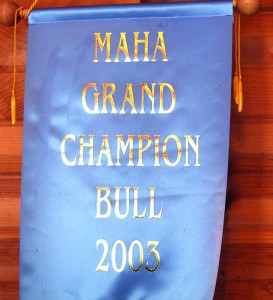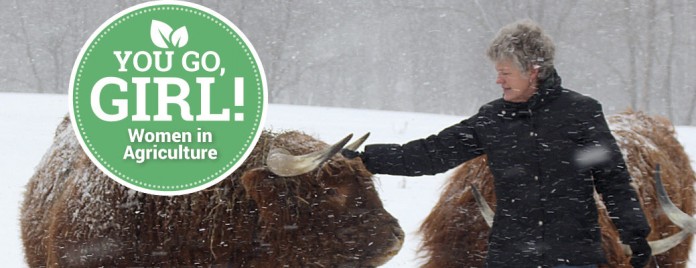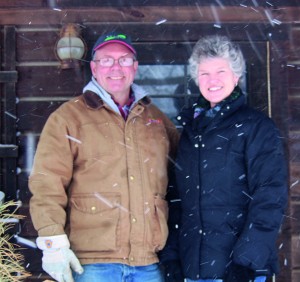(Editor’s note: We continue our eight-week Women in Agriculture series profiling some of the women who play key roles in the region’s agriculture. We’re proud to salute them — and others — who illustrate the diversity of farmers and farm leaders today.)
GROVE CITY, Pa. — Judy Ligo is known in the cattle show world as “the cow whisperer,” but she brings more to the table than just her ability to handle and fit cattle. She brings a lifetime of farm management, diversification and entrepreneurship.
Ligo was raised on a 300-acre Guernsey dairy farm in Jefferson County, Pennsylvania, and her family expanded the farm to include a milk processing plant, dairy store, bakery, frozen food distributorship and a Guernsey Maid Restaurant.
Ligo’s father, Gene Harding, died in an automobile accident in 1974 at age 44, leaving her mother, Jan, to manage the dairy farm and businesses, as well as raising five children, on her own. All five children — Jeff, Jim, Judy, Jennifer and Greg — grew up doing their part on the family farm.
Head for agribusiness
Judy knew early on she enjoyed farming and being around cattle, so she headed to Penn State University and majored in dairy science, with a minor in agricultural economics.
When she graduated, she went to work for the lease financing company Telmark, developing relationships with farmers and educating them about leasing options.
Ligo worked her way up the ladder and eventually was named the regional credit manager for Telmark. She managed people working in five states and worked with farmers to find the best financing deals for their individual farming operations.
A farm of her own
She said she was lucky because she got to work from her home office. Although her work took her across western Pennsylvania and eastern Ohio, she was able to work her own farm with her husband, John, before she left for work.
Meanwhile, her husband, John was also working in agricultural finance at Farm Credit Services as a loan officer.
The couple had purchased a farm in Grove City, in Mercer County, but knew the farm had to find a way to support itself, and began making plans to build a dairy.
“If you can manage it, it can be worthwhile. The dairy cattle did us very well,” said Ligo.
They agreed they would milk for 20 years. The first 10 years would pay for the buildings, cows and labor. The second 10 would secure the farm. The Ligos started out with 200 Holsteins and went to work building the facilities, including a milking parlor and barns.
Then Telmark was bought out, and Ligo was forced to farm full time.
Ligo said it was the life for them. But after 22 years of milking, they decided the 24-hours-a-day, seven-days-a-week dairy routine was getting to be too much for the couple, and started transitioning the farm to a beef cattle facility.
She said the couple feels lucky the dairy was able to pay for the cattle facilities, and admits that if they had started out with beef cattle, it might not have worked out so well and questions whether beef cattle would have paid for itself.
Retail beef
The Ligos raise Angus and Angus cross cattle, and operate as a commercial cow-calf pair and finishing operation. They sell retail beef to consumers, grocery stores and farmers markets across the region. The business is growing and she expects they may reach the point where they don’t have enough cattle to meet the demand.
The only limitation to the business is feeding the cattle in the winter. She said they like to house the cattle in the winter, and that means there are only so many spaces to put cattle to feed them.
Ligo said the Angus cross range from a cross with Highland genetics, Holstein genetics, Hereford genetics and others. She said she likes crossing the Angus with Highland cattle for a couple of reasons. One is that is the cross appears to make the cattle more intelligent, quieter and calmer when working with them.
Ligo said other Highland traits go with the Angus genetics very well, including the ability to be a wonderful mother and finishing out well.
The Ligos shoot to calve in 90 days in the spring and they keep watch on the mothers around the clock. Judy Ligo does most of the breeding decisions on the farm, and she likes to see the calves hit the ground, the result of her decisions. The farm uses a lot of artificial insemination to keep building the herd.
“It’s fun in the spring to see 100 of them (calves) out there running and playing,” said Ligo.
Today, there are 400 head of beef cattle on the farm and she expects 180 calves this spring.
Local food angle
The beef the Ligos produce is primarily fed a forage diet and finished on corn silage and high moisture corn. Ligo said the result is a consistently flavored natural beef product.
She said there is a definitely a movement toward local products and their market is people who are health conscious and environmentally conscious. They attend the Farm to Table Conference held in March, which helps make the connection between the farm and the people purchasing the products.
“It’s important for us to do a good job that people appreciate,” said Ligo.
She said by using direct marketing, they can maintain the idea of the farm’s beef being special, particularly since it grades well, usually prime or high choice.
Highland cattle
Ligo got into Highland cattle as a hobby, and has been breeding and showing them for 15 years. She eventually built a side business because of the attention she garnered from her success in the show ring with the Li Terra herd.

“I got hooked on it,” said Ligo.
Now, Ligo wants to enjoy mentoring and helping customers who have bought cattle from her. She has sold Highland breeding stock in 19 states and generated several hundred thousands of dollars from the sales of her Highland cattle.
“It’s become more than a hobby. It’s a niche,” said Ligo.
Women work to earn respect
Ligo said 30 years ago when she started in agriculture finance, it was a difficult field to enter, and there were few women in it.
“You had to work your way in and prove you knew what you were doing,” she said. “I had to be able to show I knew the difference between a steer and a heifer and knew what farmers meant by non-GMO corn.”
One key to Ligo’s success has been her mom, Janet Harding-Ruslavage. Ligo said her mother is her role model and inspiration as a pioneer for women in agriculture.
“Anything I have done pales in comparison to the challenges she faced. But I learned early on that you simply do ‘whatever it takes,’” said Ligo.
Ligo said it is much easier for women to be involved in agriculture than it was years ago when she was starting out, and technology has helped to make it easier.
She added that farming isn’t or doesn’t have to be the manual labor it used to be. She said women can bring their own set of skills to the table and still be an accomplished farmer.
“It’s a viable career path,” said Ligo.
Currently, the Ligos are transitioning their farm to a young couple, and are working on setting up a limited liability company. They have found someone who is young and ambitious, so they are willing to put some of the farm’s equity, along with the young farmer’s time and work, into making a deal.
More women in ag stories:
- Ones to watch: Young women in agriculture April 23, 2015
- At the helm of Ohio Cattlemen’s, Elizabeth Harsh works to ‘be fearless daily’ April 23, 2015
- Farm or nonfarm worlds: Extension dairy specialists know both sides April 16, 2015
- Ohio State researcher committed to the science of animal health April 9, 2015
- Donniella Winchell puts Ohio wine on the world stage April 2, 2015
- Breaking the ‘grass’ ceiling: East Ohio Women in Agriculture Conference draws 135 March 30, 2015
- Annie Warmke: Back to the Earthship March 26, 2015
- Leah Miller helps farmers, communities get things done March 19, 2015
- Pitching farm life: Brenda Hastings takes dairy industry in an all new direction March 5, 2015
- The ones to watch: Help us find the millennials who will be tomorrow’s leaders in agriculture March 5, 2015
- It’s OK to ‘farm like a girl’ March 5, 2015
Learn about your local farmers by getting
Around the Table.
It's a FREE weekly e-newsletter all about food. Sign Up Today!















Do you ever speak at womens groups?
What about speaking to high school or even middle school girls? Or FFA chapters? Today’s kids can use as much positive role modeling as possible. Her experiences would be great to share with kids.
“Anything I have done pales in comparison to the challenges she faced. But I learned early on that you simply do ‘whatever it takes,’” said Ligo. – exceptional advice for life and career! We make time for what matters, and we learned it from those who came before us.